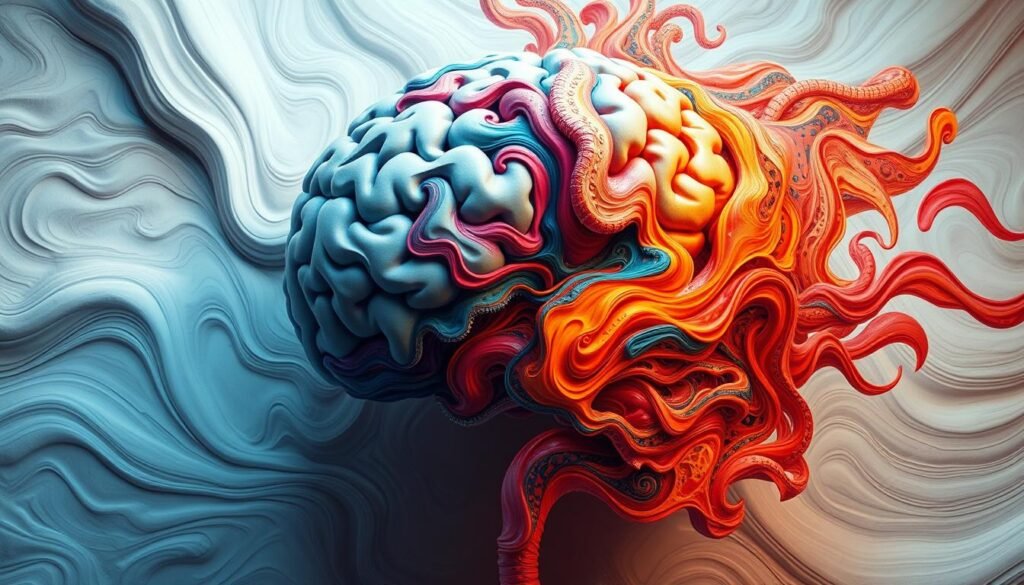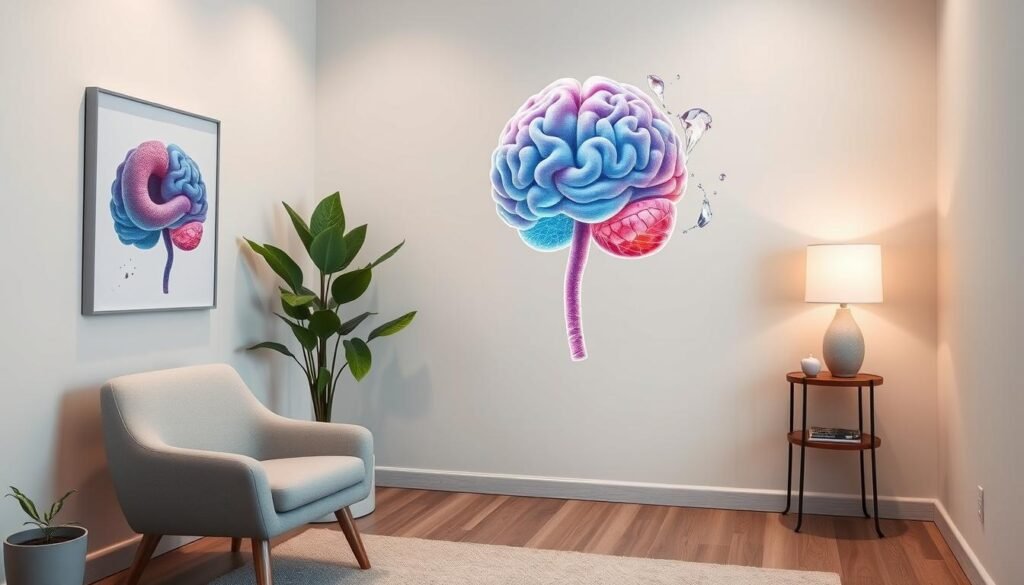Did you know up to 40% of people might face functional bowel issues in their lifetime? This fact points to how common irritable bowel syndrome (IBS) is, affecting 5% to 10% of us. It’s also tied closely with emotional well-being. Almost 40% of those with IBS are also tackling anxiety disorders. This battle can make IBS symptoms even tougher to handle.
There’s a deep link between our mind and gut, known as the gut-brain connection. Emotional stress can lead to gut problems. IBS symptoms like belly pain, bloating, and changing bowel habits can cause isolation and even depression. To live better with IBS, it’s crucial to care for both mental and physical health. Tackling IBS from every angle is key to improving quality of life.
Key Takeaways
- Up to 40% of IBS patients also experience anxiety disorders, showcasing a vital connection between mental and digestive health.
- IBS affects 5% to 10% of the general population, causing significant disruptions in quality of life.
- Emotional stress can exacerbate IBS symptoms like pain and bloating.
- Dietary changes and lifestyle modifications can mitigate IBS symptoms but may not work for everyone.
- Gut-directed hypnotherapy has proven to be an effective treatment with long-lasting benefits for many IBS sufferers.
Introduction to IBS and Its Impacts
Irritable bowel syndrome (IBS) affects millions and leads to symptoms like diarrhea, constipation, and abdominal pain. Up to 40% of people with IBS also face an anxiety disorder such as depression or PTSD. This shows a deep connection between IBS and mental health, highlighting the need for treatments that cover both aspects.
The unpredictability of IBS greatly affects daily activities, leading to food anxiety and avoiding social events. People with IBS often have trouble eating out or being in crowds, making their anxiety worse. Studies have found that more anxiety can lead to worse IBS symptoms. This indicates how important emotional health is in managing IBS.
Social stress hits hard for those with IBS. Feeling tense in social situations can make them withdraw, lowering their life quality. Studies show that IBS sufferers might overreact to stress, linking back to the body’s fight or flight reaction.
To tackle IBS effectively, we need a treatment plan that addresses both body and mind. Combining diet changes, psychological support, and relaxation methods can improve well-being. Here’s a chart showing common IBS symptoms and their effects on mental health:
| IBS Symptoms | Psychological Impact |
|---|---|
| Diarrhea | Increased anxiety during social situations |
| Constipation | Feelings of frustration and helplessness |
| Abdominal pain | Contributes to chronic stress and emotional distress |
| Bloating | Heightened awareness of bodily sensations, leading to anxiety |
| Food intolerance | Fear of adverse reactions leading to food anxiety |
What is IBS?
Irritable bowel syndrome, or IBS, is a condition that disrupts everyday life. It brings symptoms like bloating, gas, and abdominal discomfort. This is due to the complex relationship between the digestive and nervous systems.
About 15 percent of people deal with IBS. Studies show that those with IBS often struggle with anxiety and depression. In fact, these emotional issues are twice as common in people with IBS than those without.
There’s no single cause of IBS. Rather, it’s believed that genetic, environmental, and psychological factors all contribute. Symptoms are linked to processes also found in anxiety disorders. This highlights the need to take care of both mental and physical health.
For more details, the Mayo Clinic offers extensive information on managing IBS effectively.
The Gut-Brain Connection Explained
The gut-brain connection is an essential link between the brain and digestive system. It works through the brain-gut axis. This allows for interactions that affect our health. The enteric nervous system (ENS) is key in this. It has over 100 million neurons. It is known as the body’s “second brain.” This system manages the gut, playing a big role in how our bodies work each day.
The vagus nerve links the ENS directly to our brain, letting signals move both ways. How we feel can change how our gut works. And problems in the gut can affect our mood. Studies show that long-term stress can mess with the Hypothalamic-Pituitary-Adrenal Axis (HPA). This leads to more inflammation and issues like IBS. People with IBS often have different immune responses, with more immune cells in their gut.
Studies say the gut microbiome’s makeup can shift in those with IBS, affecting inflammation and pain. Serotonin, an important brain chemical, mainly lives in the gut. Stressful times, anxiety, and depression can make gut-brain issues worse. This makes IBS symptoms more severe for those affected.
To sum up, here’s a table of key parts of the gut-brain connection:
| Component | Function | Impact on IBS |
|---|---|---|
| Enteric Nervous System (ENS) | Regulates digestive activity | Linked to GI symptoms and motility issues |
| Vagus Nerve | Connects ENS and brain | Facilitates bidirectional communication |
| Gut Microbiome | Influences health and mood | Imbalances can worsen IBS symptoms |
| Serotonin | Regulates mood | Contributes to emotional well-being |
| Chronic Stress | Affects HPA axis | Linked to increased GI inflammation |
Learning about the gut-brain connection helps us understand how our emotions and health are linked. Knowing this is key to dealing with IBS and improving life quality for those impacted. For more, check out this detailed article on the gut-brain axis.
How IBS Anxiety Develops
The link between IBS and anxiety is complex, involving both biology and psychology. There seems to be a genetic connection that may lead people with IBS to also have anxiety. This shows that the development of IBS anxiety is a layered issue, not just a simple coincidence.
Chronic stress is a key trigger for IBS anxiety. Those with IBS often face more stress, which can mess up gut-brain communication. Stress can make IBS worse by increasing symptoms like pain, diarrhea, and constipation. This creates a loop where IBS causes stress, which then makes IBS even worse.
Also, people with mental health issues like depression or anxiety are more likely to get IBS. This means doctors need to check IBS patients for anxiety too. Treatment should help both the mind and the gut.

Mast cells and eosinophils in the gut might also affect anxiety in IBS patients. High levels of these cells have been found in young IBS sufferers. This suggests a link between the immune system, IBS, and anxiety. Treatments often focus on managing both anxiety and IBS symptoms.
Understanding IBS anxiety means we must address both mental and physical symptoms. Knowing what triggers IBS anxiety, like stress and past traumas, helps. This knowledge is crucial for creating treatments that really support those living with IBS and anxiety.
Common Symptoms of IBS and Anxiety
Irritable bowel syndrome (IBS) shows up in ways that can really change your day-to-day life. You might notice issues like:
- Cramping and abdominal pain
- Bloating
- Diarrhea or constipation
- Gas and flatulence
These physical problems often mix with feelings of anxiety. When this happens, people might feel:
- Feelings of unease or restlessness
- Panic attacks
- Increased heart rate
- Difficulty concentrating
Studies show a link between IBS and anxiety problems. About 44% of those with IBS also feel anxious. This anxiety can make IBS worse, and IBS can make anxiety spike too. It’s a cycle that makes both feel even bigger.
It’s key to see how these symptoms are linked. It helps in finding the right way to deal with them. Here’s a quick look at common symptoms for IBS and anxiety:
| Symptoms of IBS | Anxiety Symptoms |
|---|---|
| Cramping and abdominal pain | Restlessness |
| Bloating | Panic attacks |
| Diarrhea or constipation | Increased heart rate |
| Gas and flatulence | Difficulty concentrating |
If you have IBS, it’s smart to watch out for these signs. Knowing how anxiety ties to IBS lets you better manage both.
Understanding IBS Anxiety
IBS anxiety is a mix of mind stress and gut health. Stress makes IBS symptoms start a chain of body reactions. This makes the nervous system overactive, causing more digestive problems. Understanding this link helps in dealing with both anxiety and IBS together.
Effects of Stress on IBS Symptoms
For those with IBS, stress makes things worse. It brings on a fight-or-flight response that affects digestion. Symptoms like bloating and pain get worse under stress. This makes managing stress key to easing IBS symptoms. Stress’s big role highlights why we need mindfulness and relaxation in our lives.
The Role of Anxiety Disorders
Anxiety is closely linked to IBS. About 44% of IBS patients also have anxiety, and 84% deal with depression. This shows how each condition can make the other worse. For managing both, methods like Cognitive Behavioral Therapy (CBT) and changing one’s lifestyle can help. They improve life quality and control symptoms.
Coping Strategies for IBS Anxiety
Those dealing with IBS anxiety have several coping strategies to make life better. They can change their diet, practice mindfulness, and try other helpful methods. These ways help manage IBS symptoms and the anxiety that comes with it. They are shaped to fit what each person needs.
Dietary Modifications
Making changes to your diet is a first step to improve digestive health. It’s important to find out which foods make IBS worse. Dairy, gluten, and caffeine can increase discomfort. Writing down symptoms can help identify these foods. Advice from healthcare providers helps make the right changes for you.
Mindfulness Techniques
Mindfulness, like deep breathing and relaxation, helps deal with stress from IBS. It raises awareness and helps you relax, easing IBS symptoms. Doing these practices often has been linked to less anxiety and better mental health.
Other Therapeutic Interventions
There are many treatments for IBS anxiety. Cognitive behavioral therapy (CBT) is one that works well. It deals with the thoughts and feelings that affect the gut. Other options include acupuncture, acupressure, and hypnosis. Regular physical activities, such as yoga or swimming, can also help by keeping the digestive system running smoothly.
| Intervention Type | Description | Benefits |
|---|---|---|
| Dietary Modifications | Identifying and avoiding food triggers. | Reduces gastrointestinal discomfort and improves symptoms. |
| Mindfulness Techniques | Practices like meditation and deep breathing. | Promotes relaxation and alleviates anxiety. |
| Cognitive Behavioral Therapy (CBT) | Focuses on addressing negative thought patterns. | Helps manage IBS symptoms and reduces anxiety. |
| Exercise | Engaging in activities like yoga or running. | Regulates intestinal contractions and enhances mood. |
| Acupuncture and Hypnotherapy | Alternative therapies aimed at relieving IBS symptoms. | Can provide symptom relief without dietary changes. |
Cognitive Behavioral Therapy for IBS
Cognitive Behavioral Therapy (CBT) is growing popular for treating irritable bowel syndrome (IBS). Around 35 million Americans battle IBS. This condition often leads to anxiety and somatization. Thus, treatments that support mental health are crucial.
Recent studies show CBT offers significant benefits for those with IBS. It helps patients feel better both mentally and physically, improving their quality of life. CBT deals with the emotional factors influencing IBS. It teaches patients to manage stress and negative thoughts using techniques like thought restructuring and adaptive coping strategies.

Stress can make IBS worse by causing the body’s fight-or-flight response. This can upset digestion and cause flare-ups in sensitive digestive systems. Although CBT isn’t a cure, it’s a valuable tool in managing IBS. It equips patients with skills to handle emotions and learn relaxation techniques.
For those with severe IBS not helped by usual treatments, CBT offers hope. Studies prove it is particularly effective for patients with additional psychological issues. The success rate is high, with one in three patients improving after CBT sessions focused on gastrointestinal disorders.
Linking mental health with gut health is essential for effective IBS management. GI specialists and mental health experts working together can improve CBT access for IBS patients. Those needing help should look for therapists skilled in both psychological and gastrointestinal care. For more on how anxiety affects digestion, visit this resource.
Exploring Gut-Directed Hypnotherapy
Gut-directed hypnotherapy takes a unique stand in helping with Irritable Bowel Syndrome (IBS). It uses the deep link between mind and gut. By focusing on relaxation and guided imagery, it aims to improve how the brain talks to the gut. Over several sessions, patients learn powerful techniques to get better.
What to Expect During a Session
A standard session lasts about 30 minutes. In it, the therapist helps the patient relax deeply. They use a series of seven sessions every two weeks, supplemented by daily audio practices. This helps patients fully grasp and use what they learn consistently.
Long-term Benefits
Many studies show lasting positives of this therapy for IBS sufferers. Symptoms like stomach pain, bloating, and bowel issues see great improvement. Over 75% of participants felt better after the treatment. Moreover, it greatly cuts down IBS-induced anxiety. Thus, it does more than just fix symptoms; it boosts gut health and emotional wellness too.
Diet and IBS Anxiety
The link between diet and IBS anxiety is key for handling symptoms well. About one in seven people have irritable bowel syndrome. This condition leads to symptoms like stomach pain, bloating, and changes in bowel habits. Anxiety and stress often join these symptoms, making the situation worse.
Some foods can make digestive and emotional problems worse. High FODMAP foods are known to cause flare-ups. But, there are diets that help IBS anxiety by focusing on gut health. The low FODMAP diet helps about 75% of those who try it feel better. This means not just better digestion but also less stress and a better life.
Adding prebiotics and probiotics to daily meals helps the gut stay balanced and might help with anxiety. Foods rich in these elements are central to managing IBS anxiety. For example, yogurt, kefir, and fermented foods add good bacteria to the gut. Meanwhile, bananas, asparagus, and oats feed these beneficial bacteria and help them grow.
Teaming up with health experts helps people with IBS make tailored diet plans. These plans look at food sensitivities and emotional health. This approach tackles both the mind and gut issues in IBS anxiety.
Using mindfulness with diet changes brings big benefits. It shows we need a broad outlook on treatment. Mindfulness and a low FODMAP diet together can lead to better emotional health. This shows that the right diet can affect how we feel.

| Food Type | Effects on IBS Anxiety | Examples |
|---|---|---|
| High FODMAP Foods | May trigger symptoms and increase anxiety | Wheat, garlic, onions |
| Low FODMAP Foods | Can help control symptoms and lower stress | Bananas, carrots, chicken |
| Probiotic Foods | May improve gut health and reduce anxiety | Kefir, yogurt, sauerkraut |
| Prebiotic Foods | Encourages growth of beneficial bacteria | Oats, asparagus, garlic |
Using these dietary tips can help manage IBS anxiety better and lead to a healthier life. Understanding how diet affects us shows a useful way to handle symptoms and boost mental health.
Conclusion
Research has shown a strong link between IBS and anxiety, with 220 articles spotlighting this. Around 11% of people worldwide suffer from IBS. This condition often leads to high anxiety and depression levels.
About 39.1% of those with IBS also face anxiety issues. This can seriously affect their health and how they enjoy life. Thus, it’s key to help them manage their symptoms and emotional challenges.
To deal with IBS anxiety, a detailed plan is vital. It should teach patients about their condition. Plus, it must include coping methods talked about in this article. These include diet changes and mindfulness. Other helpers are cognitive behavioral therapy and gut-directed hypnotherapy.
These strategies help patients feel in control again. It moves them towards better health despite IBS.
Knowing the link between IBS and anxiety helps patients a lot. It leads to treatments that care for both their mental and physical health. As studies grow, the push for therapies that cover both the mind and gut strengthens.